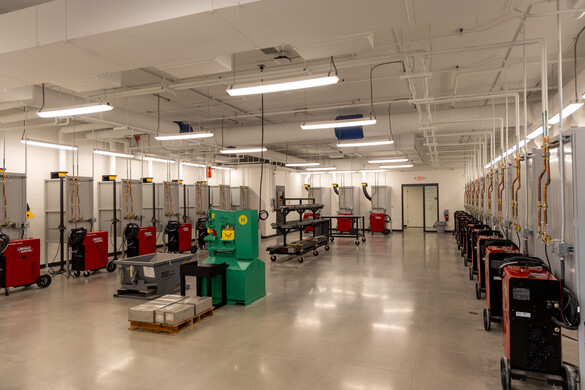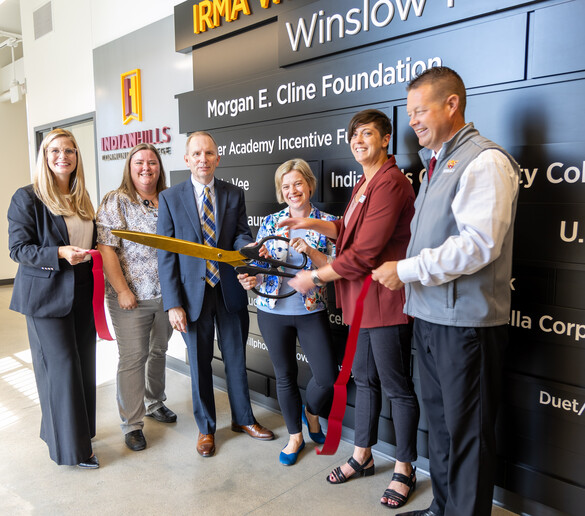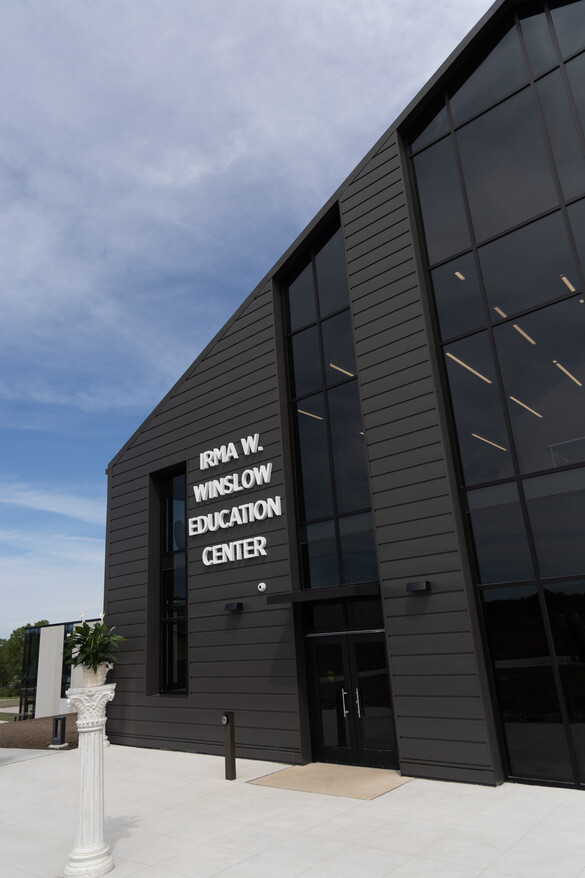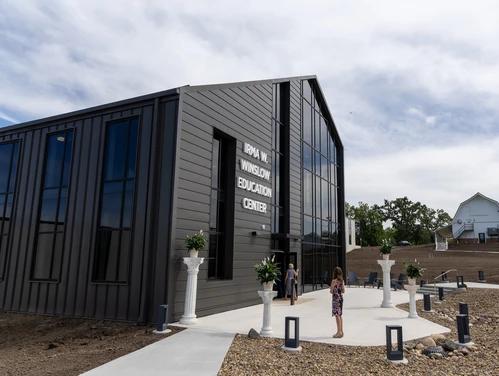When students returned to the Centerville campus of Indian Hills Community College, the new crown jewel of the campus, the Irma W. Winslow Education Center, greeted them.
The 66,000-square-foot facility will impact every student on the IHCC Centerville Campus with 22 classroom spaces, laboratories, machine shops, a library, a cafeteria and collaboration spaces for students and the community.
Funded in part by a competitive grant through the state’s Career Academy Incentive Fund, the Irma W. Winslow Center will change the trajectory of the campus and surrounding school districts. Being a Regional Center that offers several career academies, the facility will be utilized for concurrent enrollment coursework where high school students earn both high school and college credit and expand opportunities for students to attain an industry-recognized credential with labor market value. The career academy courses also provide the direction and appropriate foundation for students to enter a postsecondary program while forging partnerships between employers, schools, postsecondary institutions and the community.

"We're always focusing on career and workforce education and a pathway for students to start a two-year degree and move on to a four-year college or university," said Indian Hills Community College President Dr. Matt Thompson. "Being able to have the Regional Center right here on site with career technical education programs is a great starting point for young people in our region. In our area, proximity to a college campus is really critical."
In serving school districts in Appanoose, Wayne, Davis, Athens, Monroe and Lucas counties, Indian Hills Community College can serve high school students by preparing them for careers in fields such as construction technology, agriculture, health sciences and welding without those students needing to leave Centerville. Previously, many students would have to travel extended distances to the Ottumwa campus to pursue education and training in those fields.

"Creating an opportunity that's closer to them than having to drive an hour and 20 minutes to Ottumwa was essential," Thompson said. "We're really looking at this campus as a major hub for the western portion of our 10-county region that we serve and focusing on those career-ready, workforce-ready programs and the jobs of the future that provide great, family-sustaining wages."
Built into a hillside on the northwest edge of Centerville, the welcoming three-story structure features ample natural light and vistas to the surrounding rolling countryside. This modern architectural design starkly contrasts the 13 modular buildings it replaced that were designed to be temporary when constructed in 1971. Many of those buildings had no hallways, outdated classrooms and required students and faculty to exit the building to use centrally located restrooms.
"This building is about equity and learning opportunities for our students [in Centerville], and also the western part of our region," said Dr. Jill Budde, Indian Hills Vice President for Learning and Engagement. "I don't think people believed this was a possibility, and it really opens up the opportunity for our community to see what is possible for them. It allows us to have a future of growth. We didn't have a future of growth with what we had here before."
In establishing that future of growth, Indian Hills Community College planned the Irma W Winslow Education Center to meet today's students' needs and to provide the space, flexibility and efficiency to increase enrollment and build additional programs to serve the community. With the career academy students in the Regional Center combined with community college students, approximately 600 students will attend the Centerville Campus this year. Dr. Bianca Myers, Indian Hills' Executive Dean for Advancement sees no reason that number should not jump to more than 1,000 in the near future.

Part of that growth will be spurred by bringing a nursing program to the Centerville Campus to meet a critical need in the community. The foundation of that program is already underway with Indian Hills' High School Health Academy, which allows high school students to take courses and earn their Certified Nurses Assistant (CNA) certification at Centerville while in high school. In the near future, those High School Health Academy graduates can continue their education in Centerville through state-of-the-art nursing simulation labs.
"This was really a priority as we were doing the planning to ensure that we had these hands-on learning opportunities with simulation," Budde said. "This is a game changer for us. We suspended nursing because of low enrollment in Centerville three years ago. We are thrilled to be able to bring it back to this area as it is obviously a huge need in all parts of our state, but especially in this community. We need nurses."
Budde anticipates the classroom and lab space will allow the program to easily expand enrollment in the nursing program three-fold while adding courses in phlebotomy within the next year and other short-term certifications to meet immediate community needs. Indian Hills also plans to add programs in other areas, including commercial truck driving.
Those lab spaces are some of the seven labs in the facility, all outfitted with brand-new equipment and supplies, including lab space for construction, agriculture, industrial maintenance, CDL simulation, and welding, in addition to the health science and nursing labs.
Outside of the hands-on training those spaces create, students will also learn in nine traditional classroom spaces that are anything but conventional. The nine classrooms have three different capacities to accommodate anywhere from 24 to 48 students, with all of the seating and technology being entirely mobile, allowing each space to be configured to the ideal setting for the students and curriculum.
Three computer labs, a library, bookstore, mental health counseling and administrative space are also included to support students. Hy-Vee Dining Hall, a top-of-the-line commercial kitchen that provides students meals, anchors the facility's center. An adjacent communal space to eat and congregate looks out onto the campus. Staff anticipates this space and others may be used by other community organizations and the public, helping meet a need in the community for meeting spaces.
The facility is named after Irma Willie Winslow, a lifelong learner and benefactor of Indian Hills Community College. Born in 1913, Winslow moved to Iowa with her husband and youngest son in 1951. Years later, she earned an associate's degree from Indian Hills in 1982 at the age of 69 and continued her education by earning degrees from Iowa State in 1985 and 1997. In addition to funding a scholarship at Indian Hills, Winslow, who passed away in 2007, delighted in often being the oldest enrolled student as she continued taking classes until she was 91.
Planning to honor Winslow's legacy with the center began in 2021 when voters passed a $28 million bond referendum with 73.2 percent of the votes. However, due to pandemic-influenced increases in construction costs, Indian Hills still faced a financial shortfall in completing the facility and its vision. A combination of federal and state grants, including the Career Academy Incentive Fund, along with support from local businesses, private foundations and local philanthropists, bridged that gap, giving Indian Hills students the venue that will transform their career trajectory and opportunities while laying the foundation for a strong workforce those industries can draw from for generations to come.
"You look at the Donor Wall, and you see a lot of local industry that invested in this project, and it's so amazing to see that buy-in," Myers said. "Using industrial maintenance as an example, the number of people that need machine repair everywhere from Lee Container to Amcor to East Penn Manufacturing. They're saying 'ok, you're going to train our workers, and we're going to help with that.'"
________________________________________________________________________
The Career Academy Incentive Fund was established by a 2019 law that extends a statewide penny sales tax for school infrastructure, called Secure an Advanced Vision for Education (SAVE), through January 2051. The Iowa Department of Education may award up to $5 million annually to support career academy partnerships among community colleges, school districts, business and industry, Regional Planning Partnerships, Area Education Agencies and others to increase student access to college programs, state-of-the-art equipment and career paths in Iowa’s in-demand fields.
